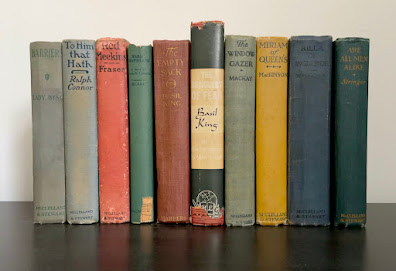 |
| The Globe, 3 December 1921 |
The Great War must surely have ranked as the preeminent condition. There were years in which the conflict came close to dominating 'Recent Books and the Outlook.' The 1920 edition had an entire section devoted to books about the war:
Not only is the Great War barely mentioned in the 1921 'Recent Books and the Outlook,' just three of its 206 books are related to the bloodshed just twenty-four months past. Great War poetry disappears entirely... and with it poetry. I exaggerate, but only slightly. Eight volumes of verse are listed, down from nineteen the previous year; four are Canadian:
My Pocket Beryl - Mary Josephine BensonLater Poems - Bliss CarmanBill Boram: A Ballad - Robert NorwoodBeauty and Life - Duncan Campbell Scott
Fiction in other countries has been disappointing during the last year, and has certainly not proved as rich as biography or history. American readers fall into two classes says the New York Times Book Review, those who like John Dos Passos' "The Three Soldiers" and those who do not.The correct title is Three Soldiers.
 |
| My copy (New York: Doran, 1921) |
The Lone Trail - Luke AllanAnne of the Marshland - Lady ByngBarriers - Lady ByngTo Him That Hath - Ralph ConnorThe Lobstick Trail - Douglas DurkinThe Gift of the Gods - Pearl FoleyRed Meekins - W.A. FraserMaria Chapdelaine - Louis Hemon [trans W.H. Blake]Maria Chapdelaine - Louis Hemon [trans Andrew Macphail]The Quest of Alistair - Robert A. HoodThe Hickory Stick - Nina Moore JamiesonLittle Miss Melody - Marian KeithThe Conquest of Fear - Basil KingPartner of Chance - H.H. KnibbsThe Snowshoe Trail - Edison MarshallPurple Springs - Nellie McClungRilla of Ingleside - L.M. MontgomeryAre All Men Alike? - Arthur StringerThe Spoilers of the Valley - Robert Watson
As my 1942 World Library edition (above) suggests, The Conquest of Fear is a work of philosophy. The Globe describes it at a novel:
The inclusion of Arthur Stringer's Are All Men Alike? is just as intriguing. The author published two books in 1921, the other being his heart-breaking roman à clef The Wine of Life. By far the finest Stringer I've read thus far, my dream is to one day bring out an edition featuring the twenty-four James Montgomery Flagg illustrations it inspired.
I haven't read it, nor have I read Jess of the Rebel Trail or Little Miss Melody. I have read Miriam of Queen's and The Window Gazer, both of which disappointed. The Empty Sack is my very favourite Basil King title, and yet it too pales beside The Wine of Life.
What do I know? I think Three Soldiers is the best novel of 1921.
Yes, I'm one of those who like it.
















